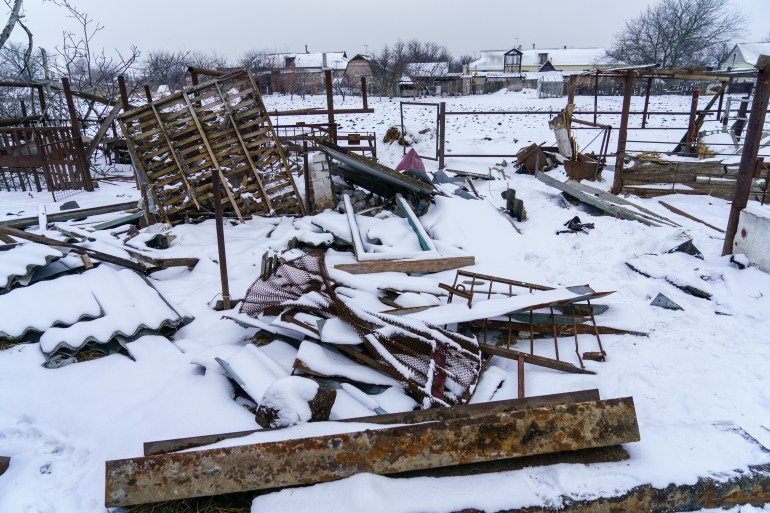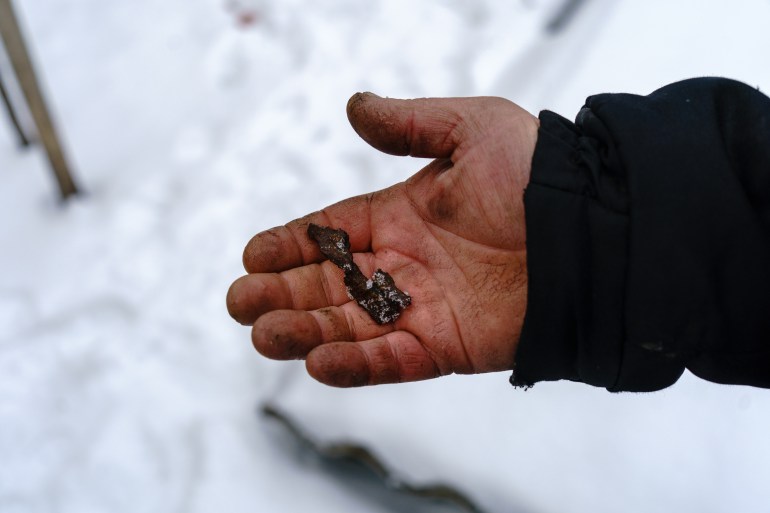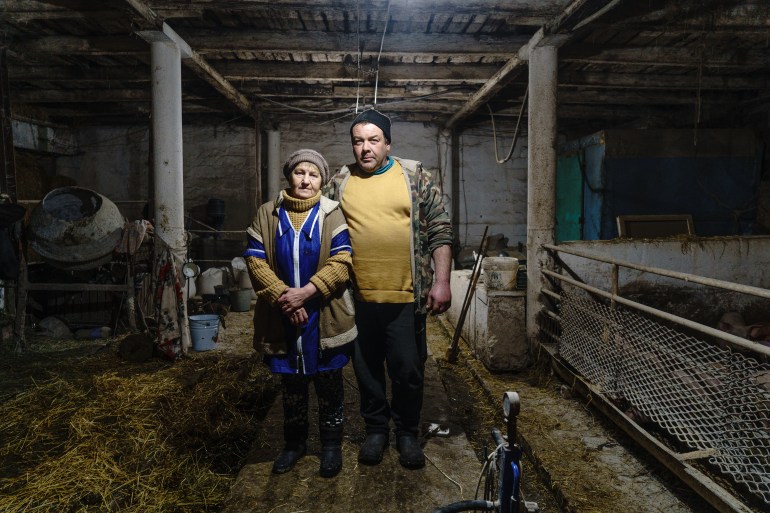Nevelske, Ukraine – Surrounded by empty wheat fields and buried under a thick layer of snow, the village of Nevelske in eastern Ukraine’s Donbas region lies all but abandoned – it was destroyed amid an escalating Ukraine-Russia crisis that has taken Europe to the brink of conflict.
Located just 24 km (15 miles) northwest of separatist-held city Donetsk, residents of the farming settlement had weathered more than seven years at the coalface of a conflict between Ukrainian forces and Russian-backed separatists, until heavy shelling in mid-November caused most of its remaining residents to flee.
Before the war began in 2014, about 300 people lived in Nevelske, according to the UN humanitarian affairs office (OCHA). The population had fallen to 45 by the time of the November attacks – now only a handful remain.
The shelling took place amid simmering tensions between Russia and the West over Ukraine, with Moscow amassing tens of thousands of troops and an array of military hardware near Ukraine’s border.
 Valentina Omelnycka and Andriy Dmytryuchenko’s back yard in Nevelske [Emre Caylak/Al Jazeera]
Valentina Omelnycka and Andriy Dmytryuchenko’s back yard in Nevelske [Emre Caylak/Al Jazeera]‘Everything was destroyed’
Before the attacks, Nevelske was a relatively modern village, with bathrooms and indoor toilets – a luxury in the poverty-stricken, rural region.
Residents had worked hard to develop the village by hand and could plant enough vegetables in the fields nearby to be mostly self-sufficient, something particularly important for older residents who were unable to work.
The home of Valentina Omelnycka, was ringed with a blue picket fence and had a lush garden where she grew flowers and grapes in summer, and had a pen in the yard for herAn abandoned house in Nevelske village, Ukraine cherished pigs.
The 63-year-old put “so much love” into her house, she said.
After the first attack took place on November 14, she and her husband of 24 years, Andriy Dmytryuchenko, 45, had hoped it was a one-off and decided to remain in their home.
But in the early hours of the morning on November 18, Dmytryuchenko recalls seeing a light in the sky through the window and calling Omelnycka and stepdaughter Olha Snehovska, 36, to their shelter in the basement.
“Everything was shaking, and when we came out everything was gone and we didn’t sleep at all that night,” said Dmytryuchenko.
 Dmytryuchenko, 45, showing a shrapnel piece from his old house’s garden in Nevelske [Emre Caylak/Al Jazeera]
Dmytryuchenko, 45, showing a shrapnel piece from his old house’s garden in Nevelske [Emre Caylak/Al Jazeera]“We looked around the yard and saw the barn was gone, ducks were laying dead and pigs, one full of shrapnel, were dead … We tried so hard to make it nice and everything was destroyed in 40 mins.”
The pig pen had been razed, an unexploded shell became lodged in the wardrobe and 12 kittens were killed.
As is the case other settlements in the militarily controlled area Ukraine’s Joint Force’s Operation calls the “red zone”, hearing gunshots and explosions is a part of daily life in Nevelske.
It has weathered fighting since war broke after Russia invaded and annexed Ukraine’s southern Crimean Peninsula and backed separatists who captured large swathes of the country’s east.
The two sides reached a ceasefire in 2015, but hostilities have continued and almost 14,000 people have been killed, including more than 3,000 civilians.
Tensions between Russia and the West reignited in October, as Ukraine attacked a howitzer operated by Russian-backed separatists with an armed drone and with the emergence of satelite images that appeared to show Russia had amassed tens of thousands of troops near its borders with Ukraine.
Western leaders have been scrambling to defuse a crisis, which some have warned could lead to an invasion of Ukrainian territory, by reaching out to Russia, while attempting to ramp up pressure by promising harsh sanctions in the event of an invasion.
‘They aimed straight at us’
Omelnycka and Dmytryuchenko, both of whom have gold-toothed smiles and gentle blue eyes, said that over the course of the conflict, mines and other weapons had struck gardens and fields, but rarely houses in the village.
“After the heaviest fighting here in 2014, people came back after a month, but this time I don’t think they will. Then, the bombing was random, but this time it felt like they were aiming to hit peoples’ houses,” said Omelnycka.
“They know civilians live here, we shouldn’t be targeted. But they aimed straight at us.”
Of the village’s 50 buildings, 16 were hit and 11 were destroyed. A military doctor who was posted to the village sustained serious shrapnel wounds, but later recovered in hospital. Several farm animals were killed.
 Valentina Omelnycka, 63, and Andriy Dmytryuchenko, 45, in their friend’s barn near Pisky, Ukraine [Emre Caylak/Al Jazeera]
Valentina Omelnycka, 63, and Andriy Dmytryuchenko, 45, in their friend’s barn near Pisky, Ukraine [Emre Caylak/Al Jazeera]Many of Nevelske’s houses are still habitable, including Omelnycka and Dmytryuchenko’s, but the attacks left the village without gas and electricity, and without water due to the use of electric-powered water pumps.
There is no longer a grocery shop, with the nearest a ten-minute drive away. Residents are wary about investing money in costly repairs to their homes when they believe the village could be targeted again.
Residents say they have received small amounts of humanitarian aid from the International Committee of the Red Cross and Czech charity People in Need.
The growing concern about a possible escalation of hostilities has raised fears of a worsening of the humanitarian crisis in the wider region.
Rights group Amnesty International warned on Friday that further armed conflict in Ukraine would have devastating consequences for the human rights of millions and could cause a refugee crisis. Some 1.45 million people have been internally displaced, according to government figures.
 A calendar showing the month of November, when the last attack happened, inside an abandoned house, Nevelske [Emre Caylak/Al Jazeera]
A calendar showing the month of November, when the last attack happened, inside an abandoned house, Nevelske [Emre Caylak/Al Jazeera]Dmytryuchenko and Omelnycka are now staying temporarily at his sister’s house in a nearby village. They will soon need to find a more permanent solution, but are not yet sure how they will pay for rent.
When a village is damaged, they say, prices nearby go up due to increased demand from those fleeing. According to Dmytryuchenko, house prices in the area have soared in recent years.
“We are talking to friends in other cities like Nipro – their kids took them away – and I call them and talk about moving to where they are. We cry every time because they want to come back and we want to stay here,” she said.
“I just want peace and the rest we can do ourselves. Maybe then even those who left in 2014 would come back.”
World - Latest - Google News
January 31, 2022 at 02:47AM
https://ift.tt/MQj6EhSJp
War-weary residents lament homes lost in eastern Ukraine shelling - Al Jazeera English
World - Latest - Google News
https://ift.tt/XTLnj7SQk

No comments:
Post a Comment